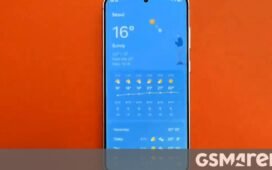iQOO launched the iQOO Neo9 and Neo9 Pro last year in China, but only one smartphone escaped the country – the iQOO Neo9, which was introduced as the Neo9 Pro in India. The most notable difference between the Chinese Neo9 – called Neo9 Pro globally – and the Chinese Neo9 Pro is in the chipset and camera departments.
The Neo9 Pro is powered by Dimensity 9300 SoC and features a 50MP ultrawide camera, while the Neo9 has the Snapdragon 8 Gen 2 chip at the helm and sports an 8MP ultrawide camera. We used the Indian iQOO Neo9 Pro – sharing hardware with the Chinese Neo9 – for over a month, and here’s what we found about it.
Design
The iQOO Neo9 Pro is built around a 6.78″ 8T LTPO AMOLED display having a 3,000 nits peak brightness and 144Hz screen refresh rate. The screen also has a punch-hole for the 16MP selfie camera and a fingerprint scanner embedded for biometric authentication.

The fingerprint reader was fast and accurate, and we faced no issues while using it. However, it could’ve been placed slightly higher for ease of reach, facilitating a more convenient smartphone unlocking experience.

Turn the phone around, and you see an LED flash and two cameras – 50MP primary and 8MP ultrawide. The iQOO Neo9 Pro comes in Fiery Red and Conqueror Black colors, and it’s the red version that we received for review.

The Conqueror Black version’s back cover is made of fingerprint-resistant Fluorite AG Glass, while the Fiery Red model’s rear panel flaunts a Dual-Tone Vegan Leather Design. iQOO says that it is carbon fiber vegan leather and skin-friendly lychee vegan leather “seamlessly integrated for an ultra-thin edge,” resulting in a “unique and premium look and feel.”

Well, the red model looks nice, and the faux leather – which is what it is – helps with the grip, but not as much as we’d have liked. It also doesn’t feel as premium as the leather finish we have on the more affordable Realme 12 Pro series smartphones.

On the upside, the iQOO Neo9 Pro Fiery Red’s vegan leather finish ensures it doesn’t get smudged with fingerprints, which would require constant wiping to keep the phone in its pristine form if you don’t use a protective case.
Regardless of which version you buy, the iQOO Neo9 Pro comes with flat frames and a back panel, with the latter having slightly curved edges like the iQOO 12, making the phone comfortable to hold despite flat frames. The smartphone is also light enough for prolonged usage. However, the protruding rear cameras make it wobble on flat surfaces and move when it vibrates upon receiving calls and notifications. That’s not ideal since the phone could fall if kept near the edge of a flat surface.

The iQOO Neo9 Pro’s right-side frame has a power button and volume rocker with decent feedback, and at the bottom is the USB-C port, flanked by a SIM card slot, primary microphone, and a speaker grille. Up top is another microphone, joined by an IR blaster.
The Neo9 Pro is IP54-rated, and we like its overall design.
Display
The iQOO Neo9 Pro packs a 6.78″ 144Hz 8T LTPO Always-On AMOLED display of 2,800×1,260-pixel resolution and 452 ppi pixel density. It’s protected by Schott Xensation Up and supports 1.07 billion colors. It also has HLG, HDR10, HDR10+, and Widevine L1 certifications.
iQOO went with an X-Axis Linear Motor for the Neo9 Pro, which provided great haptic feedback that made typing on the screen fun. It also provides 4D Game Vibration when gaming, which enhances the overall gaming experience.
The display was also plenty bright, which made it easy to watch media and read text under direct sunlight at max brightness.

The iQOO Neo9 Pro also comes with an independent display chip called Supercomputing Chip Q1, which, the brand says, helps achieve low latency with high frame rate games, lower power consumption at high frame rates and resolution, and lower temperature during heavy gaming sessions. The Game Super Resolution and Game Frame Interpolation features are enabled with the Chip Q1, with the latter advertised to help achieve a frame rate of 144 FPS in games.
That said, the iQOO Neo9 Pro has Smart Switch, Standard (60Hz), and High (144Hz) refresh rate options, with the screen supporting 10 refresh rates in total – 1Hz, 30Hz, 40Hz, 45Hz, 51Hz, 60Hz, 72Hz, 90Hz, 120Hz, and 144Hz. However, iQOO says 144Hz is only for gaming – which is a bummer – so the maximum refresh rate achievable during non-gaming usage is 120 FPS.

With the screen refresh rate set to High (144Hz), the refresh rate bumped up from 1Hz to 120Hz for the system menus and apps when interacting with the display. It remained at 10Hz when viewing an image in Google Photos and at 30/60Hz when watching videos on Facebook, Instagram, Twitter, Google Photos, and YouTube.
The Standard (60Hz) mode was basically the High mode, except the refresh rate went up to 60Hz. In Smart Switch mode, the apps went up to 90 FPS when interacting with the screen, with only the homescreen, app drawer, app switcher, Settings app, and the Play Store having 120 FPS support. However, like the Standard and High Mode, the Smart Switch mode also switched to 10Hz when viewing an image and 30/60Hz when watching videos.
We tried Call of Duty Mobile, Dead Trigger 2, Real Racing 3, and Sky Force Reloaded on the iQOO Neo9 Pro, and only the last two games ran at 120 FPS – that too in High Mode – with others being capped at 60 FPS. COD is included in the list of games supporting 144 FPS gaming, but that wasn’t the case during our usage, even with Game Frame Interpolation enabled.
To conclude, if you want the smoothest possible experience, the High refresh rate mode is your best option.
Software and Performance
The iQOO Neo9 Pro is powered by the Snapdragon 8 Gen 2 SoC and comes with up to 12GB of LPDDR5X RAM and 256GB of UFS 4.0 storage. Ours is the top-end 12GB/256GB model, running Android 14-based Funtouch OS 14 out of the box.

The iQOO Neo9 Pro comes pre-loaded with third-party apps, but most can be uninstalled. The overall software experience is similar to that of the iQOO 12, so you might want to read our iQOO 12 review to learn more about Funtouch OS 14.
We had no performance issues with the iQOO Neo9 Pro since the smartphone was smooth and snappy in everyday usage. It also handled heavy games during long gaming sessions very well while remaining reasonably cool even in hot Indian summers. However, as we already mentioned, some games that iQOO advertised with 144 FPS support remained capped at 60 FPS.
Camera
The iQOO Neo9 Pro sports three cameras – one of the front and two on the rear. The selfie shooter on the front uses a 16MP Samsung ISOCELL S5K3P9SP04-FGX9 1/3.1″ sensor. It has an f/2.45 aperture and can record videos in 1080p resolution at 30 FPS.

The dual camera setup on the rear comprises 50MP primary and 8MP ultrawide units. The primary camera uses the Sony IMX920 1/1.49″ sensor with vivo Camera-Bionic Spectrum (VCS). It has OIS, f/1.88 aperture, and can record 1080p and 4K videos at 30 and 60 FPS, while 720p and 8K video recording is limited to 30 FPS.
The 8MP ultrawide unit uses the OmniVision OV08D10-GA5A-001A with an f/2.2 aperture and an FOV of 119˚.

The iQOO Neo9 Pro’s primary and ultrawide cameras were quite quick to capture images, and we rarely saw any shutter lag in the default Photo mode. In the 50MP mode, the primary camera expectedly took a bit longer to click the pictures, while Night Mode took even longer in both the default and 50MP modes.
During the day, the iQOO Neo9 Pro’s 50MP primary camera took good photos in the default Photo mode. However, sometimes, the pictures clicked with the primary camera in the Photo mode and 50MP mode had inconsistencies in colors.
Moreover, the colors in the pictures taken in Photo mode with the primary and ultrawide cameras looked similar but were different in the 50MP high-res mode.
The iQOO Neo9 Pro’s 50MP primary camera clicked decent pictures at night as well, and in the 50MP high-res mode, it did a better job of retaining details in the shadows than the Photo mode. The colors were also closer to the source, especially the skies.
Photos taken with the 8MP ultrawide camera at night were softer than the ones captured with the primary camera, especially around the edges. The colors also looked a bit washed out at times. Also, regardless of whether you used the primary or ultrawide camera, many low-light pictures had lens flare.
However, it’s worth mentioning that photos clicked with the iQOO Neo9 Pro in low light weren’t as noisy and soft as those taken with the iQOO Neo7 Pro, which is appreciated.
You can check some pictures we took from the iQOO Neo9 Pro below.
Daylight Photos
Let’s look at the daylight photos first, captured with the 50MP primary camera having an output of 12.6MP in Photo mode.
Primary camera, 12.6MP (23mm).
Ultrawide camera, 8MP (16mm).
Primary camera, 50MP (High resolution, 23mm).




Primary camera, 50MP (High resolution, 23mm)
Nighttime Photos
Now, let’s take a look at some nighttime photos.
Primary camera, 12.6MP (23mm).
Ultrawide camera, 8MP (16mm).
Primary camera, 50MP (High resolution, 23mm).




Primary camera, 50MP (High resolution, 23mm)
Battery
The iQOO Neo9 Pro ships with a 5,160 mAh battery. We couldn’t run our standard battery test on the iQOO Neo9 Pro, but anecdotally speaking, the smartphone should easily get most people through the day on a single charge. We got a screen-on time of over seven hours with a 120Hz refresh rate, always-on display, 5G mobile data, and Wi-Fi hotspot enabled the whole time. Our usage consisted of web browsing, using social media apps, and streaming YouTube videos. With about an hour of heavy gaming, our average screen-on time dropped to 4-5 hours.

Once the iQOO Neo9 Pro’s battery is drained, you can fill it up with the bundled 120W power adapter. It’s advertised to juice up the cell from 1% to 50% in 11 minutes, but in our testing, it charged 1% to 14% in 5 minutes, 32% in 10 minutes, 34% in 11 minutes, 43% in 15 minutes, 50% in 17 minutes, 56% in 20 minutes, 79% in 30 minutes, and 100% in 38 minutes.
These charging tests were run with the Always-On Display turned on, and your mileage will likely vary depending on your usage and ambient temperature when charging the phone.
Conclusion
The iQOO Neo9 Pro is one of the best mid-rangers you can buy in India right now. It has a snappy performance and handles games well. It features a 144Hz LTPO AMOLED panel with nice outdoor legibility. The battery life is also very good, which, when paired with 120W fast charging, makes for a perfect combination.

The iQOO Neo9 Pro’s 50MP primary camera clicks decent pictures. They may not be the best in this range, but then again, the Neo9 Pro isn’t a camera-centric smartphone and mainly focuses on performance. However, we’d like to see some software optimizations from iQOO for a more consistent camera performance from the Neo9 Pro.
The iQOO Neo9 Pro starts at INR34,999 ($420/€390) in India, and it is worth considering.
































